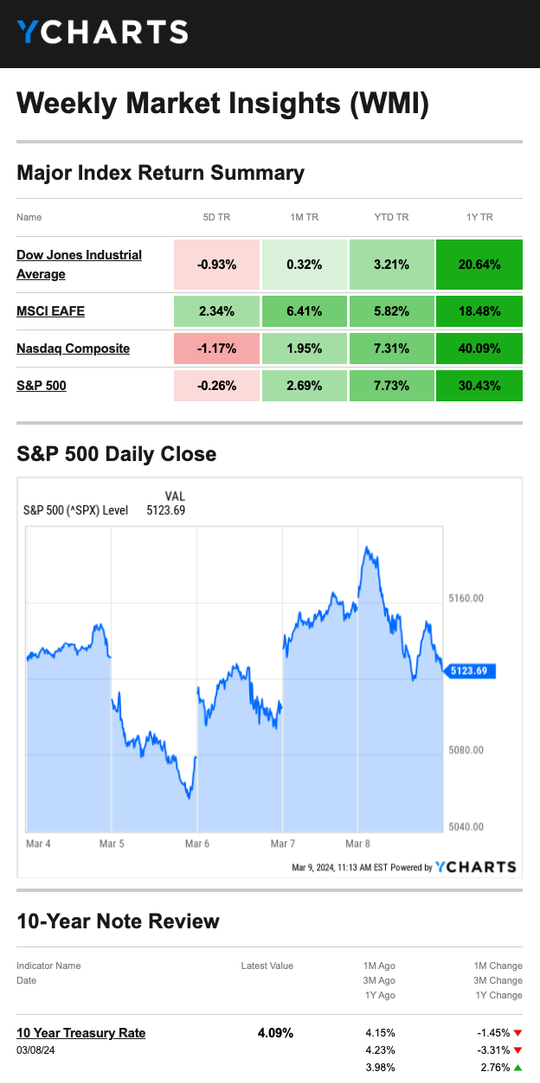Stocks were down for the week as investors appeared to take some profits and traders parsed Fed Chair Jerome Powell’s Congressional testimony.
Markets Wobble
Stocks had a rough start to the week, with the Dow, S&P 500, and Nasdaq each off more than one percent on Tuesday alone. Mega-cap tech stocks were under pressure as investors appeared to take some profits.
Markets clawed back much of their losses on Wednesday and Thursday, with the Fed Chair’s upbeat comments to the Senate Banking Committee boosting stocks. Chair Powell said that once the Fed was confident inflation was tracking “sustainably at 2%,” the Fed would consider cutting short-term interest rates. The S&P 500 and Nasdaq rallied, with the S&P hitting a record close.1,2,3
Friday’s employment news threw some uncertainty into the mix. The economy added 275,000 jobs in February—exceeding the 198,000 expected—but wage growth slowed, and jobless claims edged up. Some investors saw that as a negative, while others viewed it as a “Goldilocks” moment—an economy that’s not too hot or cold. Stocks initially rallied on the news, but profit-takers appeared to arrive as the day progressed.4,5

| Source: YCharts.com, March 9, 2024. Weekly performance is measured from Monday, March 4, to Friday, March 8. ROC 5 = the rate of change in the index for the previous 5 trading days. TR = total return for the index, which includes any dividends as well as any other cash distributions during the period. Treasury note yield is expressed in basis points. |
Fed Watch: Productivity
Productivity is one of the critical data points the Fed reviews to determine its next steps with monetary policy. Producing more goods or services with fewer resources helps the economy grow while managing inflation risks.
The 3.2 percent productivity gains in Q4 reported last week were mainly attributed to the post-pandemic repair of supply chains. However, investors may hope that artificial intelligence will play a more significant role in productivity increases.6,7
This Week: Key Economic Data
Tuesday: Consumer Price Index. Treasury Statement.
Wednesday: EIA Petroleum Status Report.
Thursday: Jobless Claims. Producer Price Index. Retail Sales. Business Inventories.
Friday: Industrial Production. Import and Export Prices. Consumer Sentiment.
Source: Investors Business Daily – Econoday economic calendar; March 2, 2024
The Econoday economic calendar lists upcoming U.S. economic data releases (including key economic indicators), Federal Reserve policy meetings, and speaking engagements of Federal Reserve officials. The content is developed from sources believed to be providing accurate information. The forecasts or forward-looking statements are based on assumptions and may not materialize. The forecasts also are subject to revision.
This Week: Companies Reporting Earnings
Tuesday: Lennar Corporation (LEN, LEN.B)
Wednesday: Dollar Tree, Inc. (DLTR)
Thursday: Oracle Corporation (ORCL), Adobe Inc. (ADBE), DICK’S Sporting Goods, Inc. (DKS), Getty Images Holdings, Inc. (GETY)
Source: Zacks, March 2, 2024
Companies mentioned are for informational purposes only. It should not be considered a solicitation for the purchase or sale of the securities. Investing involves risks, and investment decisions should be based on your own goals, time horizon, and tolerance for risk. The return and principal value of investments will fluctuate as market conditions change. When sold, investments may be worth more or less than their original cost. Companies may reschedule when they report earnings without notice.
1. The Wall Street Journal, March 8, 2024
2. MarketWatch, March 6, 2024
3. CNBC, March 7, 2024
4. CNBC, March 8, 2024
5. The Wall Street Journal, March 8, 2024
6. The Wall Street Journal, March 7, 2024
7. Bureau of Labor Statistics, March 7, 2024
8. IRS.gov, November 02, 2023
9. MyPlate.gov, December 18, 2023
Investing involves risks, and investment decisions should be based on your own goals, time horizon, and tolerance for risk. The return and principal value of investments will fluctuate as market conditions change. When sold, investments may be worth more or less than their original cost.
The forecasts or forward-looking statements are based on assumptions, may not materialize, and are subject to revision without notice.
The market indexes discussed are unmanaged, and generally, considered representative of their respective markets. Index performance is not indicative of the past performance of a particular investment. Indexes do not incur management fees, costs, and expenses. Individuals cannot directly invest in unmanaged indexes. Past performance does not guarantee future results.
The Dow Jones Industrial Average is an unmanaged index that is generally considered representative of large-capitalization companies on the U.S. stock market. Nasdaq Composite is an index of the common stocks and similar securities listed on the NASDAQ stock market and is considered a broad indicator of the performance of technology and growth companies. The MSCI EAFE Index was created by Morgan Stanley Capital International (MSCI) and serves as a benchmark of the performance of major international equity markets, as represented by 21 major MSCI indexes from Europe, Australia, and Southeast Asia. The S&P 500 Composite Index is an unmanaged group of securities that are considered to be representative of the stock market in general.
U.S. Treasury Notes are guaranteed by the federal government as to the timely payment of principal and interest. However, if you sell a Treasury Note prior to maturity, it may be worth more or less than the original price paid. Fixed income investments are subject to various risks including changes in interest rates, credit quality, inflation risk, market valuations, prepayments, corporate events, tax ramifications and other factors.
International investments carry additional risks, which include differences in financial reporting standards, currency exchange rates, political risks unique to a specific country, foreign taxes and regulations, and the potential for illiquid markets. These factors may result in greater share price volatility.
Please consult your financial professional for additional information.
This content is developed from sources believed to be providing accurate information. The information in this material is not intended as tax or legal advice. Please consult legal or tax professionals for specific information regarding your individual situation. This material was developed and produced by FMG Suite to provide information on a topic that may be of interest. FMG is not affiliated with the named representative, financial professional, Registered Investment Advisor, Broker-Dealer, nor state- or SEC-registered investment advisory firm. The opinions expressed and material provided are for general information, and they should not be considered a solicitation for the purchase or sale of any security.
Copyright 2024 FMG Suite.


